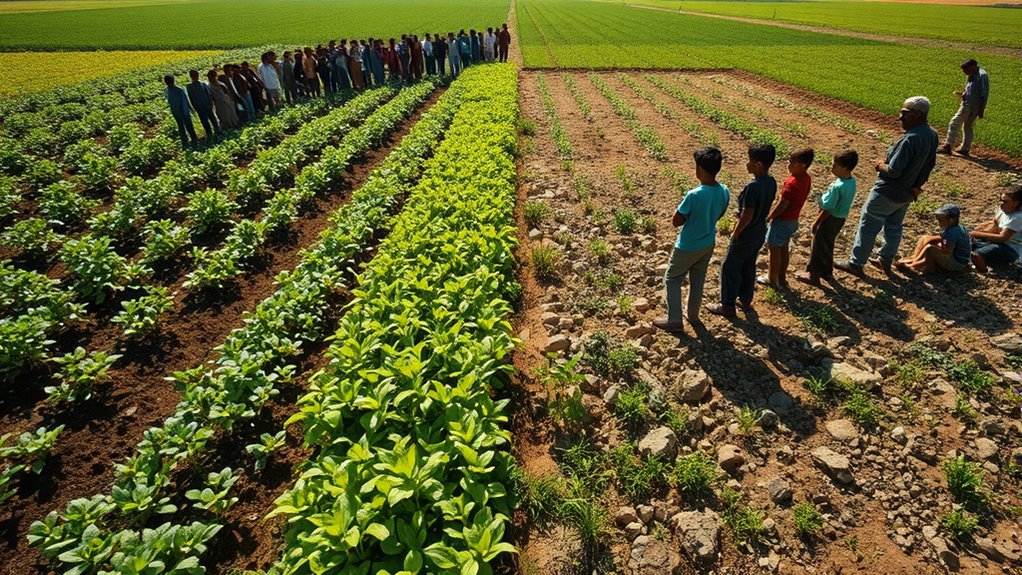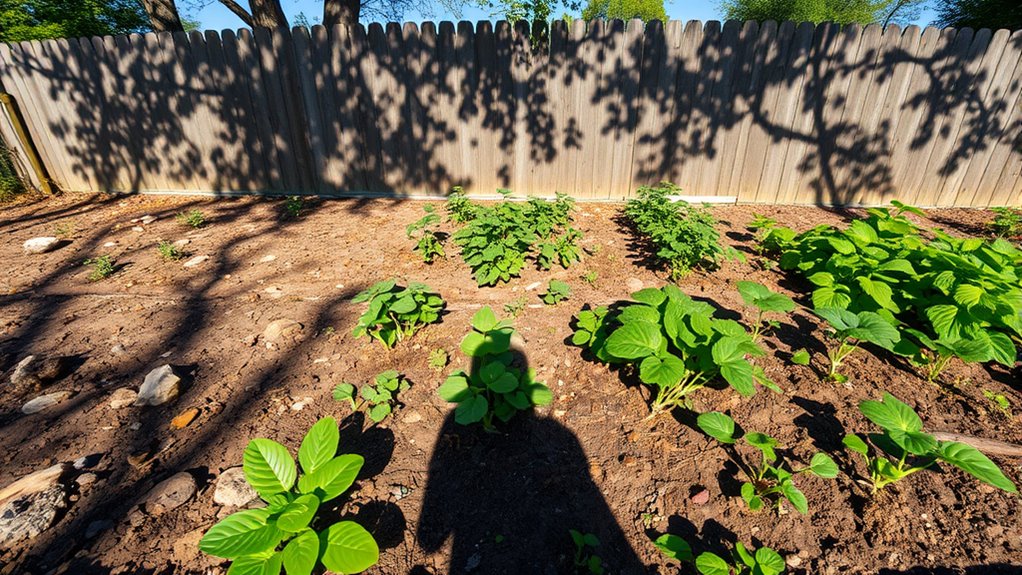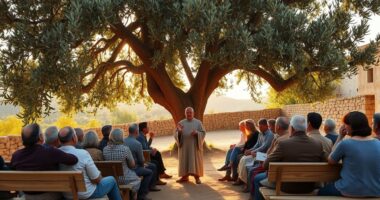People respond differently to the Gospel because their hearts are shaped by various factors like soil conditions, life circumstances, and personal beliefs. Some are resistant or superficial, while others are open and receptive. External distractions, doubts, and sin can hinder growth, but a soft, humble heart can foster deep spiritual understanding. If you want to explore how your own heart can be more prepared, there’s more to discover on how to cultivate a receptive spirit.
Key Takeaways
- Different soil types represent varying heart conditions, affecting how receptive individuals are to God’s message.
- External distractions, worries, and worldly cares hinder spiritual growth and influence responses to the Gospel.
- Internal doubts, unbelief, and unrepentant sin can block deep faith and fruitful reception of the Gospel.
- Cultural influences and community environment shape beliefs and openness to spiritual messages.
- Personal spiritual practices like prayer, reflection, and service cultivate a heart prepared to receive and grow in faith.
Understanding the Parable of the Sower

Have you ever wondered what Jesus meant when He told the Parable of the Sower? It’s about seed planting and how different soils affect Gospel reception. The seed represents God’s message, and how it takes root depends on where it lands. When you hear the Gospel, your response depends on your heart’s condition, much like soil determines how well a seed grows. Jesus used this story to illustrate that not everyone receives the Gospel equally. Some people might seem receptive at first, but various factors influence whether the seed truly takes hold and bears fruit. Understanding this helps you realize why responses to God’s Word vary so much and encourages you to examine your own heart’s readiness for the message. Recognizing the significance of prophetic dreams can also deepen your understanding of spiritual messages and divine guidance. Additionally, being aware of large numerical conversions can help contextualize the scope of spiritual growth and outreach efforts.
The Types of Soil and Their Significance

The Parable of the Sower describes four different types of soil, each representing how people receive and respond to God’s Word. The soil conditions influence seed planting and determine whether the message takes root. Recognizing the soil types can help believers understand the spiritual state of others and tailor their outreach efforts accordingly. Additionally, understanding the trustworthiness of AI models can shed light on how information is processed and received in different contexts. In the context of home furnishings, different materials used in bedding and mattress supports can impact comfort and health, just as soil quality influences plant growth. Being aware of calibration and color fidelity in visual display technology can also be compared to nurturing receptive hearts for spiritual growth. Just as proper watering and soil enrichment promote healthy plant growth, nurturing the right spiritual environment fosters genuine faith development.
- Hard soil: It’s compacted, making it difficult for seeds to penetrate, symbolizing resistance or closed hearts.
- Rocky soil: Shallow with little depth, so seeds sprout quickly but lack roots, representing superficial faith.
- Thorny soil: Filled with weeds, which choke the plant, illustrating distractions and worldly worries.
- Good soil: Loose and fertile, allowing seeds to grow deeply and produce abundant fruit, symbolizing receptive hearts.
Understanding these soil types helps you recognize how different conditions impact spiritual growth and response to the Gospel.
Factors Influencing Receptiveness to the Gospel

Several factors influence how receptive a person is to the Gospel, shaping their willingness to accept and respond to spiritual truth. Heart conditions play a crucial role; a soft, open heart is more receptive, while a hardened heart resists change. Cultural influences also impact receptiveness, as beliefs, traditions, and societal norms can either encourage or hinder spiritual openness. If your background fosters curiosity and values spiritual growth, you’re more likely to welcome the Gospel. Conversely, cultural pressures or ingrained skepticism can create barriers. Recognizing these factors helps you understand why some are more receptive than others. Your heart’s condition and cultural context markedly shape your response, highlighting the importance of approaching others with compassion and sensitivity. Additionally, understanding city dynamics can help in building connections that foster receptiveness. Community engagement can serve as a powerful catalyst in breaking down barriers and opening hearts to spiritual messages. Furthermore, embracing the emotional significance of spiritual experiences can strengthen one’s openness to the Gospel, much like how emotional responses in dreams can influence waking life decisions. Recognizing the importance of virtual environments, such as digital platforms, can also influence receptiveness by creating accessible and engaging spaces for spiritual conversations. Attuning to environmental factors, such as physical surroundings and atmosphere, can also influence receptiveness by creating a more inviting context for spiritual conversations.
Barriers to Spiritual Growth and Fruitfulness

Barriers to spiritual growth and fruitfulness often stem from internal and external obstacles that hinder your progress. These spiritual barriers act as growth inhibitors, preventing you from fully embracing the Gospel’s transformative power. Common barriers include:
- Doubts and unbelief that weaken your faith and trust.
- Distractions and worldly cares that compete with spiritual priorities.
- Unrepentant sin that creates distance from God.
- Negative influences or relationships that discourage spiritual development.
- Ignoring spiritual growth processes can lead to stagnation and missed opportunities for development. Recognizing that external influences like cultural myths and personal experiences can shape your perceptions helps you address how these factors impact your spiritual journey. Additionally, understanding the Law of Attraction reveals how your vibrational state influences your spiritual progress and manifestation abilities. Developing an awareness of the power of mindset is crucial for overcoming these barriers and aligning yourself with God’s purpose. Overcoming these barriers requires intentional effort, reliance on God’s grace, and a willingness to remove what hinders your spiritual journey. Recognizing these obstacles is the first step toward cultivating a heart open to spiritual growth and fruitfulness.
Lessons for Cultivating a Heart Ready to Receive

When you identify and address the barriers that block your spiritual growth, you create space for your heart to become more receptive to God’s word and grace. Cultivating a heart openness involves intentionally removing distractions, doubts, and stubbornness that hinder spiritual readiness. Reflect on these lessons to strengthen your receptivity:
| Remove Distractions | Cultivate Faith | Practice Reflection |
|---|---|---|
| Limit secular noise | Trust God’s plan | Journal your thoughts |
| Prioritize quiet time | Pray regularly | Meditate on Scripture |
| Avoid superficiality | Embrace humility | Seek spiritual guidance |
| Eliminate resentment | Foster gratitude | Attend community worship |
| Let go of materialism | Serve others | Read spiritual books |
Additionally, understanding the importance of freshness of juice can remind us to stay alert to the freshness and vitality needed in our spiritual lives.
Frequently Asked Questions
How Can I Identify Which Soil Type Best Describes My Heart?
To identify which soil type best describes your heart, start with heart reflection and spiritual self-assessment. Ask yourself if you’re open and receptive or distracted and hardened. Are you enthusiastic to grow, or do worries choke your faith? Be honest about your attitudes and responses. Recognizing your current spiritual state helps you understand your “soil” and guides you toward cultivating a more receptive heart for God’s message.
What Specific Practices Can Help Overcome Spiritual Hardness?
Imagine struggling to break through spiritual hardness like Sarah, who felt distant from faith. To overcome this, practice prayerful reflection daily to examine your heart honestly. Engage in intentional discipleship by surrounding yourself with supportive believers and studying scripture. These practices open your heart, soften resistance, and foster genuine connection with God, transforming spiritual hardness into receptive soil for growth and fruitfulness.
How Do Cultural Differences Affect Receptiveness to the Gospel?
Cultural perceptions and language barriers substantially influence how receptive you are to the gospel. You might find that differing cultural values shape how messages are received, either opening or closing hearts. Language barriers can hinder understanding, making it hard to connect with others’ experiences. To overcome these challenges, you need to adapt your approach, use culturally relevant language, and show genuine respect, helping others see the gospel’s relevance in their lives.
Can a Person Move From One Soil Type to Another Over Time?
Sure, you can certainly see significant soil transformation over time. As you pursue spiritual growth, your heart’s condition can shift from shallow to receptive, fostering fertile ground. This process involves consistent effort, open-mindedness, and divine guidance. With dedication, you move from one soil type to another, deepening your understanding and responsiveness to the gospel, ultimately allowing your soul to flourish and bear lasting fruit through ongoing spiritual transformation.
What Role Does Community Play in Influencing Spiritual Responses?
Community influence and peer encouragement play essential roles in shaping your spiritual responses. When you’re surrounded by people who support and share your faith journey, you’re more likely to stay committed and receptive to the Gospel. Conversely, negative peer pressure can hinder your growth. By engaging with a supportive community, you gain encouragement, accountability, and strength, helping you respond positively and steadily to God’s message.
Conclusion
Understanding the Parable of the Sower shows you that your heart’s condition greatly affects how you receive the gospel. Did you know that studies reveal only about 20% of people who hear the message truly embrace it? By identifying and removing barriers like distraction or doubt, you can cultivate a receptive heart. Keep your focus on spiritual growth, and you’ll find yourself more open to growth and fruitfulness in your faith journey.










